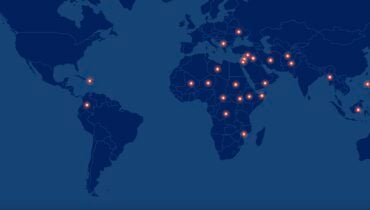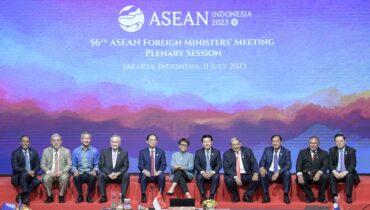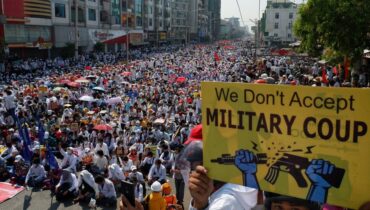In the wake of the third anniversary of the February 2021 coup that shattered Myanmar’s democratic dreams, there is still hope for change. At least, that’s what Foreign Minister of Myanmar’s National Unity Government (NUG), Zin Mar Aung, was determined to convey during her visit to Washington, DC. Zin Mar Aung—a former political prisoner and a key figure in Myanmar’s pro-democracy movement—has embarked on a series of visits in the US, shedding light on her country’s resilient fight for democracy.
In a roundtable discussion with students, hosted by the Georgetown Institute for Women, Peace, and Security (GIWPS) and moderated by GIWPS Executive Director Melanne Verveer, the Foreign Minister proclaimed that the February 2021 coup was a failure, as it ignited an ever-growing grassroots revolution against Myanmar’s infamous junta. The resistance movement in Myanmar has manifested in diverse forms, fostering unity among various ethnic groups and civil society organizations, particularly grassroots women’s groups. Beyond armed resistance by different ethnic militias against the junta’s dictatorship, numerous non-violent protests have emerged, ranging from mass silent strikes by industrial and sector workers to boycotts of commercial entities supporting the junta’s operations. These initiatives have demonstrated the resilience and creativity of the people in their fight against the military regime, and the urgent need for international support to bolster nonviolent action and support women’s groups on the ground.
However, according to the Minister, change will not happen without strong and timely international support. Support from the United States and other G7 countries for Myanmar’s democratic movement and National Unity Government is especially critical, given the evident ineffectiveness and division within ASEAN. Specifically, the Minister advocated for more targeted and comprehensive sanctions to ensure individual accountability for serious human rights abuses in Myanmar. There is already a precedent of the Office of Foreign Assets Control (OFAC) imposing sanctions on the Myanmarese military under the Global Magnitsky Act, a law that authorizes US sanctions against human rights abusers. It is imperative that the US continues to hold perpetrators of human rights abuses accountable and maintains pressure through more robust sanctions. The United States has taken a significant step by imposing a ban on financial transactions involving the Myanmar state-owned oil company, the Myanma Oil and Gas Enterprise (MOGE), generating over US $1 billion annually for the junta, as well as recently sanctioning MOGE directly. While these actions represent necessary progress, additional coordinated efforts with regional actors are essential. US sanctions alone often have minimal impact if perpetrators are able to keep their money with friendly nations who turn a blind eye or actively support their abusive regime. Bilateral negotiations and persuasive measures should be intensified to encourage neighboring countries, especially Thailand and India, to cease purchasing petroleum products from the junta, thereby undermining a critical source of funding that has sustained the junta’s atrocities and crimes against humanity since the February 2021 coup.
From a geopolitical point of view, Zin Mar Aung’s insights into the cautious engagement of regional powers such as China, coupled with the historical military ties of Russia and India with Myanmar, underscore a disconcerting lack of genuine commitment to Myanmar’s future among these regional players. The scrutiny of their involvement suggests a prioritization of geopolitical considerations and strategic interests over the democratic aspirations of the Myanmar people. In this context, it becomes evident that international pressure, particularly from the United States and its allies, is imperative to counterbalance the influence of these regional powers and advocate for the cause of democracy in Myanmar.
In addition to advocating for sanctions, the Minister emphasized the urgent need for international humanitarian agencies and the UN to explore innovative solutions for localized aid delivery. Under immense pressure and in the face of constrained resources, the NUG has tried to provide essential services to controlled territories, but collaboration and unity among ethnic groups has become paramount, as they take initiative to confront the military junta collectively.
Women especially have played a pivotal role in the humanitarian response amid conflict, demonstrating resilience and leadership in addressing the urgent needs of affected communities. Recognizing the significance of women’s movements in the country, and ensuring their active participation in any future peace processes should be a key priority for the international community. Their collaborative efforts aim not only to resist the oppressive regime but also to establish a future democratic federal union that embraces the diversity of the demographic and ethnic groups, ensuring that leadership remains in civilian hands.
In the midst of numerous ongoing conflicts, Myanmar’s struggle has been somewhat overlooked. However, according to the Minister, the non-violent movement in Myanmar, unity demonstrated by ethnic groups against the junta, and women’s unstoppable movement for the rights of all people of Myanmar represent the “only hope for democracy during the global backlash to democracy.” The democratic movement and revolutionary resistance have been relentlessly working since February 2021, gaining more and more territories, finding creative ways to provide humanitarian and social services to the areas it controls, and challenging the junta’s dictatorship, leaving us with a glimmer of hope for change to come in Myanmar.
“From the ashes and horrors, there is the potential to rise up in a new way with the leadership of Myanmar’s women, bringing about reforms that were never utilized before,” said Verveer.


